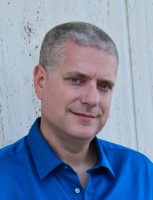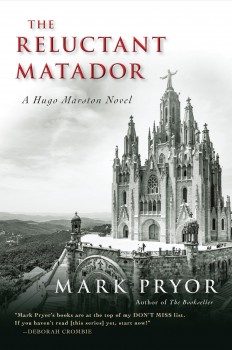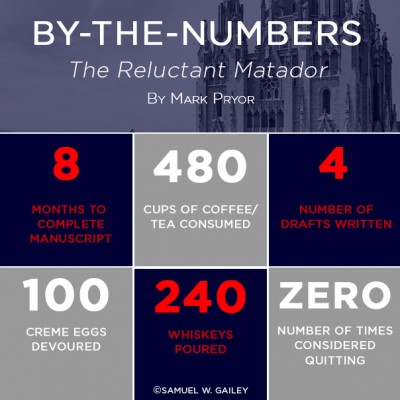The Reluctant Matador by Mark Pryor
Mark Pryor shines a light on his newest novel in the Hugo Marston series.
Mark Pryor is currently an Assistant District Attorney with the Travis County DA’s office. He is also author of the popular crime fiction Hugo Marston series. He grew up in Hertfordshire, England, and currently lives in Austin, Texas, with his wife and three young children. Before taking pen to paper (or fingers to keyboard), Mark worked at various jobs: ski instructor, personal trainer, and bra folder (I’m not making this up, I swear). But the job that largely formed his future as a writer was that of newspaper reporter in Colchester, Essex, where he covered the police and crime beat for nearly two years. In 1994, Mark moved to America, according to him, “mostly for the weather.”
Mark, thanks for taking a few moments of your time to share some thoughts and insight on your new book, your process and the life of an author. To get things started, could you tell us a few things about yourself—a little bit about your background, where you live, a day in the life of Mark Pryor.
Absolutely, and thanks for having me. Originally I’m from England, I lived there until I was twenty-five years old. My mum is from Chapel Hill, North Carolina, so I took a trip there in 1992 just to visit family, travel around the country a little. But I fell in love with the place and never really left. I went back to school in Chapel Hill and ended up in law school at neighboring Duke. I met my wife there and she brought me to Texas, where she has family.
I’ve been in Austin for almost ten years, and I work here as a state prosecutor. Right now I’m in the juvenile division prosecuting kids, although, in truth, we try to fix their problems, not prosecute them.
As for my daily life, it’s very very full. I have three kids to keep me busy, and play a lot of squash and football (that might be soccer to you) so I am a little tight for time when it comes to writing. But my family has always been so incredibly supportive, they’ve made the book thing possible. I do most of my writing on Fridays and weekends at my local library, which has just the right amount of activity and quiet.
The Reluctant Matador is the fifth Hugo Marston book in the series. Can you tell us what this particular case is about, and what helped inspire the plot?
This book involves a friend of Hugo’s, whose daughter has been kidnapped from her home in Paris. Hugo vows to help his friend and tracks her to Barcelona, Spain, where most of the story unfolds.
As for inspiration, I can point to a few things. First, my wife and I wanted to visit the city, so we took a working vacation there with the kids. It’s a beautiful, amazing place and just being there gave me all kinds of ideas. But I also wanted to take Hugo to Barcelona because in a previous book I killed off a friend of his, and that friend has a relative there. I wanted to give Hugo, and the reader, a chance to reconnect with the deceased friend again, albeit through his relative (obviously I’m being vague about who for a reason!)
What I like about your hero, Hugo Marston, is that he’s a bit of a throwback, an old-fashioned type of character—he’s smart, tenacious, and has a good sense of humor. What was the inspiration for this character, and does he have any flaws or dark secrets?
I think you’ve nailed his personality with that description. I grew up reading mysteries and loved the fedora/trilby-wearing, slightly quiet hero who watches everything unfold around him with a keener eye than most. In fact, although he’s a very handsome man I describe Hugo as “a watcher, not a player.”
He’s based a lot on my dad, who was a very intelligent, honest, and unjudgmental man, a little hard to get to know maybe, but a loyal friend. He’s also based on a couple of FBI profilers that I’ve met.
As for flaws and secrets, he’s not fared all that well with his love life in recent years. His first wife died in an accident and that’s been difficult for him—not that he dwells upon her memory but more in the way that other women don’t compare well. Apart from the newest one, Claudia, who is herself a little too independent to get overly involved with him.
I’m sure he has some dark secrets, don’t we all? You know, in book four, The Button Man, he dresses in leather pants and a leather vest to attend a secret bdsm party… although it was for a case, so maybe that shouldn’t count! Otherwise… well, I couldn’t possibly reveal them here, could I?
Staying with the topic of dark secrets, CIA agent Tom Green seems to be the polar opposite of Hugo in many ways. He struggles with alcoholism and is a bit impetuous. I love how you describe Tom as “(a) reckless personality, his bluster hiding a deeply troubled psyche.” Was it refreshing to write a character so different than Hugo?
I love writing Tom, and sometimes have to hold myself back. His recklessness and the banter with Hugo need careful attention because I don’t want to overdo them. But yes, he’s hugely fun to write. Opposite of Hugo… I think that’s very fair, in so many ways. His career took a slightly different path, too, from the FBI into the CIA and that’s where the damage was done. He doesn’t unburden himself on Hugo so we’re never quite sure what he’s done or seen, but we see the effects in his behavior. Like Hugo, though, he’s a good person and a loyal friend so you can’t help but to root for him to manage or master his troubles. Not completely, of course, because then he’d be much less fun to write!
You mentioned your job as the acting assistant district attorney with the Travis County District Attorney’s office. How does your DA work inform your storytelling?
Every now and again something will happen at work that sinks deep into my psyche and waits to be released onto the page. Honestly, though, most of the crime I see is either mundane and uninteresting, or so bizarre that if I wrote it in a story it wouldn’t be believable.
I do reach out to the cops and other professionals that I know, though, when I need practical information. Having those contacts has proven very useful indeed, no doubt about it.
I find it interesting with your background of growing up in England, that you’ve chosen to write an American protagonist from Texas.
I like “fish out of water” stories and settings. I also love Texas, Austin in particular. So what better than a cowboy boot-wearing Texan strolling the streets of Paris?! I think it’s also a nod to a place that’s become my home, having my protagonist be from here seems appropriate. And harkening back to your previous questions, wanting an old-fashioned protagonist fits perfectly with the image of the strong, silent hero (a cowboy?) setting the world to rights.
Paris is a reoccurring setting in your books, what draws you to the city as a storyteller?
It’s just so beautiful. Visually, it’s attractive because so many of the buildings are so old. I joke that I’m glad they surrendered so quickly in WW2, otherwise it might have been bombed like Europe’s other major cities. With its old and wide boulevards, its ancient winding streets, the stores and restaurants that have been there for a hundred years… it’s just such an appealing city for any story. It’s also very walkable, which means that when I go I can just meander and keep my eyes open for inspiration, take in the atmosphere of the place.
It also has a more emotional connection for me, in that my family moved to France twenty years ago. My mum still lives in the Pyrenees mountains, a more beautiful place you couldn’t find.
In THE RELUCTANT MATADOR you spend a great deal of time in Barcelona. Can you tell us why you selected this particular locale, and was it refreshing to you as an author to explore a new city?
You know, I ran the idea by my editor before I went. I wanted to make sure that his vision of Hugo was the same as mine—part of his intelligence is his curiosity and that means he’d jump at the chance to travel, go somewhere new, that he wouldn’t be put off from an investigation because it was somewhere unfamiliar. Fortunately, my editor agreed completely.
And how glad I am. Barcelona is another walkable city, a place where tiny streets appear beside you, cobbled alleyways that draw you in with the smell of meat or garlic cooking somewhere along the way. Hugo will, I think, always be based in Paris but I hope in the future he’ll continue to have these side adventures.
In your blog DAConfidential, you talk about the fear that surrounds writing. How has that fear transformed over the years?
It’s much less than it was, to be honest. I think all writers suffer from insecurity in varying degrees but several things have lessened mine. First, finding an agent and publisher who believe in me. Those hurdles were high and intimidating but as our relationships have developed, that’s given me more confidence. Also, with five books in the series now, I have some very loyal, encouraging, and supportive readers. I get the odd nasty review, of course, but I can ignore those now and focus on the good ones. I’ve also come to realize that every single book in the world has its detractors and that as long as I’m enjoying writing, and enjoying interacting with my readers, it’s all good and I have nothing to be afraid of.
Where do you see Hugo Marston in 10 years?
Like me, a little wiser, a little slower, but still in the game. I’d love to see him travel to new places, make new friends and help develop the old ones. I don’t have a long-term plan for him, I’ll just keep writing his books and hoping that people will want to keep reading them.
*****
 Mark Pryor is the author of the Hugo Marston novels The Bookseller, The Crypt Thief, The Blood Promise, and The Button Man, and the true-crime book As She Lay Sleeping. A native of Hertfordshire, England, he is an assistant district attorney in Austin, Texas, where he lives with his wife and three children.
Mark Pryor is the author of the Hugo Marston novels The Bookseller, The Crypt Thief, The Blood Promise, and The Button Man, and the true-crime book As She Lay Sleeping. A native of Hertfordshire, England, he is an assistant district attorney in Austin, Texas, where he lives with his wife and three children.
Photography credit: Alia Michelle
- The Reluctant Matador by Mark Pryor - May 31, 2015


